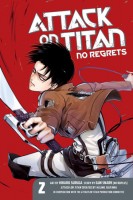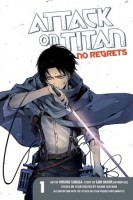 Creator: Hikaru Suruga
Creator: Hikaru Suruga
Original story: Gun Snark
U.S. publisher: Kodansha
ISBN: 9781612629438
Released: October 2014
Original release: 2014
Attack on Titan: No Regrets, Volume 2 is the final volume of Hikaru Suruga’s manga adaptation of the A Choice with No Regrets visual novel written by Gun Snark. No Regrets is one of the many spinoffs and adaptations of Hajime Isayama’s immensely popular Attack on Titan manga series. It focuses on the backstory of one of Attack on Titan‘s most beloved characters, Levi, and how he became an exceptionally skilled and valued member of the Survey Corps. The second volume of the No Regrets manga was originally released in Japan in 2014, as was Kodansha Comics’ English-language edition. The volume also includes two short, largely comedic, No Regrets side stories as well as a special interview between Isayama and Suruga discussing the story and characters of the Attack on Titan franchise. I rather enjoyed the first volume of No Regrets and so was looking forward to reading the conclusion of the series.
At one point they were considered to be some of the most notorious criminals in the Underground, but now Levi, Isabel, and Furlan have been coerced into joining the Survey Corps, which may very well be a death sentence. Initially they weren’t well-liked by their fellow soldiers, and the three of them weren’t particularly happy with their situation, either. But during their first expedition outside of the walls, Levi and his crew leave quite an impression by handily dispatching an abnormal Titan with seeming ease. Levi and the others still don’t fit in with the rest of the Survey Corps members, but at least their remarkable skills, especially Levi’s, are recognized and admired. The extra attention they receive after defeating the Titan isn’t exactly welcome, though—Furlan is trying to coordinate a covert mission that will either lead to the three criminals’ ultimate freedom or to their deaths. They have been hired by a high-ranking political figure to steal back incriminating documents from Erwin, one of the Survey Corps’ most promising young leaders, and to end his life in the process.
What I particularly liked about the first volume of No Regrets was that it expanded the setting of Attack on Titan in addition to providing valuable background information about Levi, Erwin, and their relationship to each other. Sadly, the second volume doesn’t add much more that is new; I felt like I had already seen many of the scenes play out before and it was very clear how some of the events were going to end. The second volume of No Regrets spends a fair amount of time explaining the long-distance scouting formation, for example. While it’s noteworthy that No Regrets shows the first time that the maneuver is ever attempted, anyone familiar with Attack on Titan should already be quite aware of how the formation functions and its importance. Likewise, as is to be expected, encounters with Titans never tend to go well. Because in many ways No Regrets serves as a prequel to Attack on Titan, the deaths of major characters in the series are not at all surprising and lose some of their impact as a result.
More than anyone else’s, No Regrets is Levi’s story, but Erwin plays a pivotal role in it as well. Both of the men are exceptionally charismatic leaders, although Erwin is the only one of the two who actually seeks that role. Levi doesn’t want to be responsible for the lives of others while Erwin is willing to shoulder the weight of the sacrifices made in the fight against the Titans. He is extremely intelligent and talented and able to make tough decision. Even at the cost of individual lives, Erwin voluntarily employs dubious methods if he believes that the results will increase the odds of humanity’s survival. His almost fanatical drive and obsession contrasts sharply with Levi’s more reserved and internally focused nature. As is known will happen, eventually Erwin wins Levi over to his cause and gives him a firm direction and purpose, but this foregone conclusion does seem to occur rather abruptly. Still, the exploration of Levi and Erwin’s respective personalities and motivations in No Regrets is probably what the series does best and is what the manga brings to Attack on Titan as a whole.

